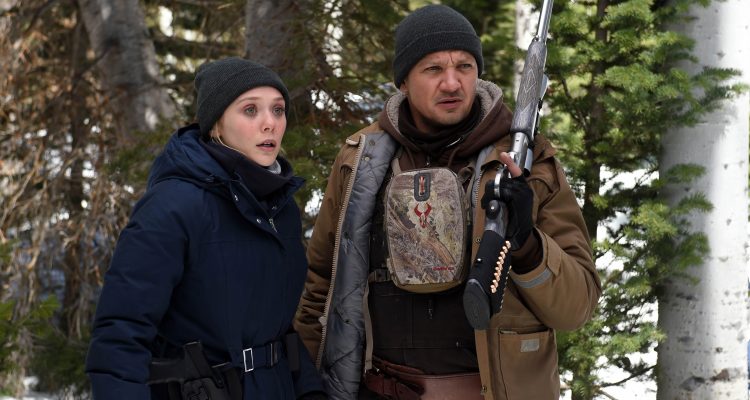It’s rare for someone’s directorial debut to be “highly anticipated,” but Taylor Sheridan’s police/western hybrid “Wind River” definitely qualifies, given that over the past two years, his scripts for “Sicario” and “Hell Or High Water” have been made into excellent, high-class action films. Sheridan’s stock-in-trade thus far has been earthy procedurals, populated by laconic, philosophical men and women who solve crimes as much through winding conversations as they do through chases and gunplay. “Wind River” is no exception. Directing his own screenplay for the first time, Sheridan pares his story and characters down to their barest essentials, making a movie that comes off sometimes as slight, but which ultimately delivers the goods for those who like smart takes on life-or-death macho adventure.
READ MORE: The 30 Most Exciting Films In The Sundance 2017 Lineup
Jeremy Renner stars as Cory Lambert, a Wyoming animal-control agent who spends a lot of time in the snowy hills of Native American reservations hunting mountain lions. One day while on the job, he comes across the body of a young girl, Natalie (Kelsey Asbille), a rape victim who died of exposure while fleeing her attackers. Though the death isn’t officially a homicide, it’s close enough to merit calling in a fledgling FBI agent from Florida, Jane Banner (Elizabeth Olsen), who arrives via Las Vegas with insufficient cold-weather gear and only minimal field experience.
A lot of “Wind River” has to do with Cory schooling Jane — and, by extension, the audience — on what life is like on the reservations in Wyoming. Some of those lessons are sociological, explaining how drugs and poverty are destroying the culture and family legacies of a proud people. But some are more technical, involving the particulars of pursuing game and fighting crime in the extreme cold. There’s scarcely a piece of winter gear that goes unused in “Wind River,” from snowshoes to snow machines to arctic-tested boots and jackets.
The wonkier “Wind River” gets, the better it is. The movie gets awfully long-winded at times, as the subdued, stung Cory delivers homily after homily about the importance of the land, the losses of the locals, and his own sad history as a man who took a native wife and then watched helplessly as their brilliant, beautiful daughter was lost to the partying lifestyle of her peers. The dialogue in this film tends toward the navel-gazing, with almost none of the comic relief that made “Hell Or High Water” a new classic.
But for the most part, Sheridan errs on the side of explanation through action. It’s one thing for Jane to be told about about how the natives distrust both whites and law enforcement, but it’s better when “Wind River” actually shows her being stymied during her investigation — even by a pragmatic-but-skeptical Bureau of Indian Affairs cop played by Graham Greene. A lot of this story boils down to arcane questions of jurisdiction, as the trail of the rapists leads through reservation drug dens and a mining camp staffed by rough-hewn private contractors hired by the government.
As a policier, “Wind River” isn’t quite twisty or pulse-pounding enough — although it does feature a couple of tense, bloody action sequences. But Sheridan as always shows a remarkable sense of place, paying attention to everything from the weather to the predators to the differences between white neighborhoods and the Native Americans’ homes. He also does an acceptable job as a director — aside from a tendency to load up on establishing shots and excess verbiage.
It matters more, though, that he’s continuing to establish himself as a writer with a niche that few others are trying to fill these days. He’s essentially been creating original crime novels for the big screen, with the kind of finely crafted characters and well-researched situations that usually only appear in books or TV shows, not modestly budgeted motion pictures. He’s a throwback to the days of William Wellman and Budd Boetticher, and genre films that weren’t B-movies per se, but were instead simple entertainments with a quietly thoughtful side. Here’s hoping he makes enough “Hell Or High Water”s, “Sicario”s, and “Wind River”s to fill a shelf — or even two. [B+]
Click here for our complete coverage from the 2017 Sundance Film Festival

